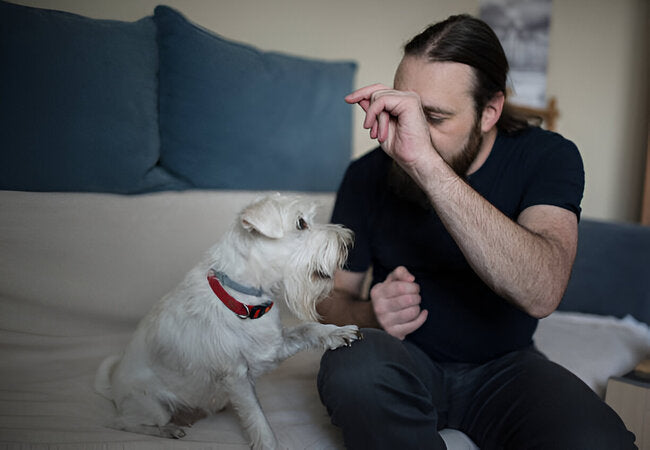2025 Vet Insight: Why Dogs Smell Bad—Expert Guide by Your Trusted Vet 🐶🩺

In this article
2025 Vet Insight: Why Dogs Smell Bad—Expert Guide by Your Trusted Vet 🐶🩺
By Dr. Duncan Houston BVSc
Hello, I’m Dr Duncan Houston BVSc, professional veterinarian and founder of Ask A Vet. If your beloved companion has been smelling unpleasant, this comprehensive guide dives into possible causes—from routine wet‑dog scent to serious medical issues—and practical solutions to restore freshness and health. 😊
1. Wet‑Dog Odor 💦
This musty, familiar smell arises when water reactivates odor‑causing bacteria and yeast on your dog’s coat. The water carries volatile organic compounds into the air as it evaporates. Promptly and fully drying your dog—using towels or a cool blow‑dryer—helps minimize the smell.
2. Skin Disorders & Infections 🦠
From bacterial or yeast overgrowth to allergies and seborrhea, skin issues are a top cause of foul odors. Conditions like dermatitis, inflamed folds (common in Pugs, Bulldogs, Shar‑Peis), or lesions can produce rancid, cheesy, or moldy scents.
Signs to Watch For:
- Redness, flaking, oily or greasy coat
- Frequent scratching, licking, hair loss
- Skin folds or hot spots emitting bad odor
3. Ear Infections 👂
Stinky ears—ranging from yeasty to sewage‑like—are often caused by otitis externa, especially in dogs with floppy ears like Cocker Spaniels and Basset Hounds. Moisture and wax accumulation foster bacterial or fungal growth.
Symptoms:
- Head shaking, scratching at ears
- Ear discharge or swelling
Veterinary treatment with antimicrobial ear cleaners and addressing underlying allergies is essential.
4. Anal Gland Problems 🐟
Dogs have two anal sacs that normally express during defecation. If impacted or inflamed, they produce a potent fishy odor that permeates bedding and can lead to scooting or licking.
Key Signs:
- Fish‑like smell from the rear
- Scooting, licking, sitting oddly
Veterinary expression or treatment is needed; high‑fiber diets or probiotics may help prevent recurrence.
5. Bad Breath & Dental Disease 🦷
Puppy breaths aside, foul, fishy, or rotten mouth odors typically indicate dental disease—such as plaque, gingivitis, periodontal disease, or infections—requiring professional care.
Dental Warning Signs:
- Yellow/brown tartar, red or bleeding gums
- Difficulty eating, drooling, pawing face
Encourage regular veterinary dental cleanings and offer daily brushing or VOHC‑approved dental chews via Ask A Vet recommendations consistent with grooming brands like Woopf or Purrz.
6. Flatulence & Digestive Upsets 💨
Excessive gas, burping, or flatulence may be due to diet changes, food intolerances, or gastrointestinal disease. This produces unpleasant odors and sometimes vomiting or diarrhea.
A consistent, high‑quality diet, slow feeding, pre‑ and probiotics, and vet diagnostics can resolve underlying issues.
7. Urinary & Systemic Infections 🚽
UTIs or metabolic disorders (like kidney or liver disease) may cause your dog to smell of ammonia, urine, or sour odors from the mouth or skin.
Associated Signs:
- Frequent urination, straining, and increased thirst
- Lethargy, changes in appetite
Veterinary diagnostics—urinalysis, blood work—are crucial for treatment.
8. Rolling & Environmental Odors 🌱
Dogs love rolling in smelly things like dead animals or feces to mask their scent or explore their world. This behavior can result in unpleasant odors that persist even after bathing.
Teach the “leave it” command, supervise outdoor outings, and wash bedding/toys regularly.
9. Senior Dog & Breed‑Specific Considerations 🐾
Older dogs and certain breeds may naturally emit stronger body odors due to changes in sebum production, skin health, or underlying conditions.
Brachycephalic (e.g., Bulldogs, Pugs) or wrinkled breeds accumulate moisture and debris, predisposing them to malodor. Regular fold cleaning, vet checkups, and grooming are essential.
10. When to See Your Vet 🩺
If odor is:
- Sudden, severe, or persistent
- Accompanied by symptoms (e.g., itchiness, discharge, behavior change)
- Unresponsive to grooming or hygiene measures
Vet evaluation helps diagnose infections, gland disease, dental problems, or systemic disorders.
Care & Prevention Checklist ✅
- ✅ Bathe monthly with pet‑safe shampoo and fully dry
- ✅ Brush coat and dental care daily or as advised
- ✅ Inspect and clean ears and skin folds weekly
- ✅ Use year‑round parasite prevention
- ✅ Monitor anal gland and digestive health
- ✅ Keep bedding, toys, and the environment clean
- ✅ Schedule regular vet wellness exams
Bringing in supportive products from Ask A Vet partners like Woopf (grooming tools), Purrz (soothing wipes), and app‑recommended dental chews ensures practical, trusted care to keep your dog fresh.
FAQs on Dog Odor ❓
- Q: Is wet‑dog odor harmful?
- A: No—it’s normal, caused by microbiome on coat, but can indicate skin infections if unusually strong.
- Q: Can diet change reduce odor?
- A: Yes—food intolerances, poor quality diets, or digestive imbalances often worsen odor. Switching diet or adding probiotics can help.
- Q: How often to I bathe?
- A: Typically, every 4–6 weeks, although breeds and activities vary. Overbathing can dry skin; underbathing can worsen odors.
- Q: Can I treat smelly glands at home?
- A: No—anal glands require vet or groomer expression. Home attempts risk impaction or infection.
Final Vet Wisdom 🏁
Unpleasant odor from your dog often signals an underlying issue, ranging from normal microbiome interactions to serious health conditions. A systematic care routine, attentive monitoring, and early veterinary intervention can tackle the source of the smell, restoring comfort and happiness for your companion 🐾❤️.
For personalized advice, treatment reminders, and product picks (like hypoallergenic shampoos, dental chews, and grooming tools from Woopf or Purrz), download the Ask A Vet app. Expert guidance is just a tap away! 📱






